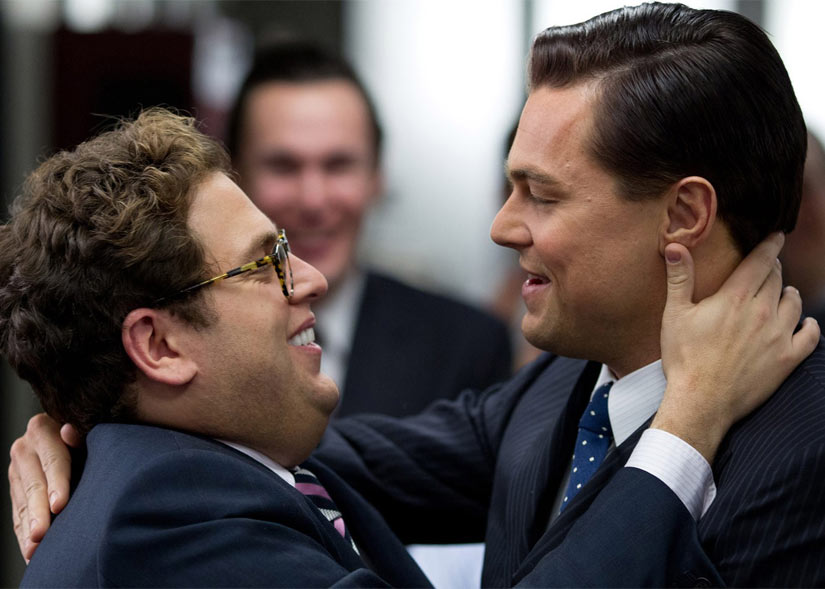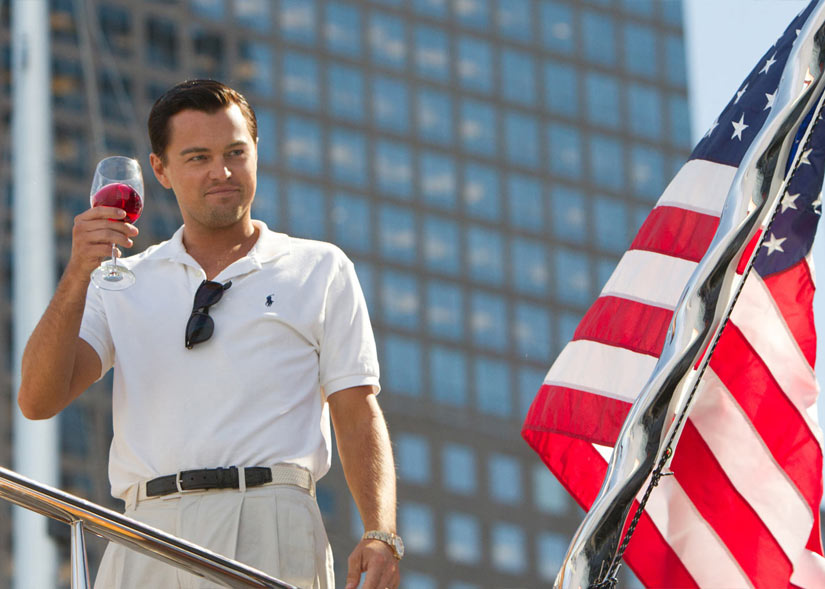The Wolf of Wall Street is the fifth collaboration between director Martin Scorsese and actor Leonardo DiCaprio. With every subsequent film made together, the two have grown increasingly comfortable with one another with DiCaprio becoming Scorsese’s contemporary muse akin to his previous collaborations with Robert De Niro. However, it’s with The Wolf of Wall Street that the two have achieved a heightened level of comfort and accomplishment that has been building up since the duo’s first film, The Gangs of New York.
To call The Wolf of Wall Street the two’s best film is an easy statement to make. To call it Scorsese’s best film, however, is a sentiment that carries almost five decades’ and more than 20 films’ worth of accolades, awards, and accomplishments. Yet, here I am right now telling you with a bold face: The Wolf of Wall Street is Martin Scorsese’s best film to date.
[youtube id=”iszwuX1AK6A”]
The Wolf of Wall Street
Director: Martin Scorsese
Rating: R
Release Date: December 25, 2013
The Wolf of Wall Street is an adaptation of Jordan Belfort’s memoir of the same name. During the late ’80s and early ’90s, Belfort and his partner Donnie Azoff (Jonah Hill) ran a brokerage firm, Stratton Oakmont, that took Wall Street by storm. Over years, the firm grew exponentially, bringing in riches for everybody in the company. Of course, their practices were less than legal, but when money talks, you listen, right? It all comes to a head when a federal agent begins to investigate the company following an expose on Belfort in Forbes.
This is the bare-bones summary of the film’s narrative. However, like any great film (let alone a Scorsese-directed one), there’s so much more to it, and to delve deeper would honestly spoil the experience for all of you reading this. Instead of digging deeper into the narrative, let me expound on why this is both Scorsese’s best film and DiCaprio’s best role to date. It’s twisted, manic, eye-opening, and everything you may ever want in cinema.
One of the most primary and prominent themes carried through Scorsese’s filmography is his analysis of machismo and masculinity, and The Wolf of Wall Street may be the most eye-opening of his films in this regard. While the film carries a dark comedy tone through its entirety, it’s through this warped lens of humor. Belfort’s story is one full of extravagance, and Scorsese exploits and perhaps even exaggerates this all to a grandiose scale. Everything from hills of cocaine snorted from a hooker’s butt crack to awkward S&M scenes to midget tossing is in The Wolf of Wall Street. Take the most ridiculous scene from every late-’90s/early-’00s rap video, mix them together, and you have a framework for The Wolf of Wall Street‘s abundance.
Yet, it all fits together and makes sense. The Wolf of Wall Street is so much more than a memoir adaptation; it’s more than just an analysis of masculinity in the face of young money. Much like Harmony Korine’s Spring Breakers, which itself was a film embodiment of the “spring break experience,” Scorsese’s latest opus is the embodiment of nihilistic hedonism, not just in narrative terms, but in the way Scorsese’s cast has never previously explored, which alone serves as the film’s highest point.
DiCaprio and Hill serve as the film’s nucleus, and the chemistry between the two is amazing. Drop any preconceptions you may have about Hill as an actor – Hill’s time to truly shine has finally arrived, and it’s through Scorsese’s masterful direction that Hill can finally shed his past as a one-note funny man. Sure, he was nominated for a Best Supporting Actor Oscar for Moneyball, but most crowds will still remember him from Superbad. Given some time, The Wolf of Wall Street will prove to be the benchmark for his career thus far. Hill’s Donnie Azoff is still essentially the same character he’s played for years (i.e. Jewish comedic foil), but he takes the character to new heights through a mixture of his comedy past and Scorsese’s ability to simultaneously reign him in and let him go.
The same thing can be said about DiCaprio’s performance, albeit at a larger scale. Simply put, you haven’t seen a Leonardo DiCaprio role like this. Keeping in line with the film’s theme of nihilistic hedonism, DiCaprio lets loose in a way I have never seen from him; it’s like he completely sheds who he once was and becomes Belfort. This comes off as a film cliche about actors losing themselves in their roles, but DiCaprio’s transformation is so brilliant and near-perfect. DiCaprio’s Belfort is manic, self-serving, nihilistic, sexist, but at the same time, he’s caring, protective, and giving. It’s this balance of portraying a lovable drug addict, a caring sexual deviant, a money-obsessed Robin Hood, a by-the-books walking contradiction that sets this performance above all of the rest.
The Wolf of Wall Street is full of risks (and rewards), and it’s the comfortability between Scorsese and DiCaprio that allows the film to even indulge in such risks (further pushing along the theme of hedonism). There’s one particular sequence towards the end of the second act where you can just tell Scorsese, DiCaprio, and Hill were just feeding off of one another’s energy. I don’t want to spoil it, but you’ll know it when you see it, and you’ll leave the scene never looking at old Popeye cartoons the same way again.
The majority of the supporting cast is full of archetypes that, for better or worse, fulfill these roles as they were needed, but don’t stick out beyond that initial need. For instance, Kyle Chandler (Friday Night Lights) is the hard-nosed federal agent, Jon Bernthal (The Walking Dead) is the badass enforcer, Brian Sacca is the mousy junior partner, etc. In a very minor, yet important role, Matthew McConaughey sets the stage for the film early on, acting as Belfort’s mentor.
As you may remember, The Wolf of Wall Street faced some editing problems a few months ago, pushing its original November date to Christmas. It clocks in at almost three hours (2 hours, 59 minutes to be exact), but you don’t feel its longevity throughout the film. Instead, you’re carried through an abundantly entertaining film that keeps the energy high from start to finish. With that said, some fat could have been trimmed, especially when the film slightly hurtles to a conclusion in the last 30 minutes or so.
The Wolf of Wall Street carries everything you love from Martin Scorsese (modern crime, analysis of masculinity, overabundance of profanity, the “American Dream,”etc.), but with a focus on exploring the comedy genre. It’s over the top, but not cheesy; grandiose, but refined. The Wolf of Wall Street is overindulgent in its riches, its drugs, its sex, and it’s everything you never knew you wanted in a film. If, heaven forbid, this is the final film between DiCaprio and Scorsese, know that they’re going out on top.




